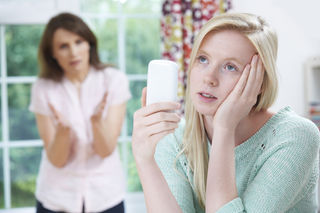Happiness
The Truth About the Effects of Screens
When it comes to how screens affect us, the "truth" doesn't make the headlines.
Posted April 15, 2019

Finding what is true in this world is elusive. Ain't that the truth? This is especially "true" when it comes to the social sciences. Math is the only pure science in the sense that it offers certainties. For instance, 2 + 2 = 4 no matter when and where a person is on the earth. It doesn't matter who is doing the calculating either. Even if a person were on the moon, Mars, or an alien in some distant galaxy, the answer would still be 4.
Even "hard" sciences like chemistry can't offer certainties. At what temperature does water boil? You might say, "100 degrees Celsius." However, the boiling point of water changes with atmospheric pressure. Medical science often gives us conflicting health information over time. You've probably seen various headlines over the years saying that, alternatively, eggs, wine, coffee, etc., are either "good" or "bad" for us. What should we believe and do?
The Slippery Social Sciences
The social sciences, which include psychology, are even less definitive than chemistry or physics. We humans are pretty complicated and many variables affect our behavior including genetics, personality, and situational variables. Within the social sciences, when we are asking whether screen use affects our well-being, the answer would be some form of "it depends."
Moreover, research can't keep up with the pace of technological innovation. Foods like eggs, wine, and coffee remain, more or less, the same over time whereas technologies develop incredibly rapidly. Thus, we can only find relative truths (i.e., it depends) versus absolute truths (i.e., always, in all instances) within the social sciences. Definitive answers just don't exist, and this is particularly true when it comes to how screens affect us.
What Are We Measuring?
Of course, our screens do affect us. It's just how we are affected and to what degree that is up for debate. Simply put, our screens create experiences, and we are affected by our experiences. How we are affected depends on too many variables to count. Measuring well-being is particularly tricky. So, if I'm trying to do a study on the effects of screens on teens, which measure should I use to assess the effects? Here are some relevant areas:
- Grades
- Sleep
- Friendships
- Happiness
- Stress
- Anxiety
- Depression
For each one of these categories of variables above, there are still many acceptable ways to assess them. For instance, for depression, are we meaning clinical depression (e.g., a diagnosis of Major Depressive Disorder) or merely feelings of sadness? Is this by self-report or parent ratings? Which depression inventory our we using? Over what period of time are we considering? Are we assessing unhappiness in the moment or a person's reflection on their overall level of life satisfaction?
I'm convinced that I could conduct a study on the effects of screens and probably find the conclusion that I want. This isn't necessarily disingenuous or devious. I'm not talking about falsifying the data either. I'm referring to designing a study in such a way that I can detect a particular effect.
For instance, I could probably design a study in which I assess some form of technoference and find that it has a negative impact on the quality of in-person social interactions. Here's the strange part. That could indeed be true (i.e., screen use can negatively affect in-person social interactions) AND it still not make an overall dent in the quality of our relationships. Say what? How is this possible?
The Experiencing Self Vs. The Remembering Self
Dr. Daniel Kahneman is a psychologist, economist, Nobel Prize winner and is widely considered the father of behavioral economics. In his popular 2010 TED talk, Kahneman describes one of the difficulties in measuring "happiness" is because of the differences between the "experiencing" self and the "remembering" self. The experiencing self is what we are feeling in the present moment. Are we feeling sick? Hot? Cold? Frustrated? The remembering self has more to do with life satisfaction upon reflection. How was your spring break vacation? Did you have a good summer? Did you like college? Did you have a happy childhood? Do you like your job?
The funny thing is that the experiencing self and remembering self are very different. The experiencing self can have lots of "happy" moments but the remembering self might be dissatisfied overall in terms of life satisfaction. You might think of famous burned-out rock stars and actors who fit the bill here. The experiencing self is more about the moment-to-moment pleasures and pains whereas the remembering self is more about overall life satisfaction and contentment.
As Kahneman describes, there is only about a .5 correlation between the two. Not to get too much into statistics here, but this would mean that roughly 75% of the variance in life satisfaction is explained by factors other than experiential happiness. In other words, knowing that someone rates high on "experiencing self" happiness doesn't tell us a lot about how they will rate their overall "remembering self" happiness (i.e., life satisfaction).
What Does This Have to Do With Screens?
When we read different articles about how screens affect us, perhaps some of the discrepant findings arise from comparing apples and oranges. That is, some researchers are talking about the effects of screens on "experiencing self" happiness and others are focusing on "remembering self" happiness. Thus, it's possible that our day-to-day screen use affects our happiness levels (positive and/or negative) in the moment AND not really affect our overall life satisfaction.
An Example of Screens Having AND Not Having a Positive/Negative Effects Happiness
The Jones family go on an annual beach vacation to South Padre Island every summer. They have a daughter, Heather, age 16, and a son, Patrick, age 11. While the family enjoy typical beach activities, Mr. and Mrs. Jones are frustrated that Heather always has her phone in hand and is taking a lot of selfies, Snapchatting, and posting to Instagram.
On a particularly picturesque Saturday morning family stroll along the shore, Heather is Snapchatting with her friends while on the family walk. Mrs. Jones has had it with Heather's phone use. "Why don't you leave your phone sometimes and actually have fun at the beach instead of posting about it? You aren't really even enjoying the beach because you are on your phone most of the time! We didn't pay for this expensive vacation just to have you glued to your phone. You can do that at home!"
Versions of this are playing out all over the world right now. Sometimes it's the parents who are on the screen more than their kids! Let's pretend we had a device or method to capture Jones family members' experiential happiness without actually interfering with that happiness. In our example, it's entirely possible that Mrs. Jones is correct. Heather's enjoyment of the beach was disrupted by her phone use. Thus, she was technically not enjoying the beach while posting selfies, seeing how many people liked her Instagram posts, etc. However, to some extent, her loss in "beach enjoyment" was offset by her enjoyment of posting pictures to Instagram and getting likes and responses from her friends. Mr. and Mrs. Jones' moment-to-moment happiness was also negatively affected by Heather's phone use, as they found her nearly non-stop phone use both irritating and disrespectful.
A funny thing happens after the vacation is over though. The family collected all of the digital photos of their vacation (Mr. and Mrs. Jones took some photos too), print and frame several, and hang their favorites in the house. They also create a digital slide show of the entire vacation and put them on display in a digital picture frame on a coffee table. As they view these vacation pictures, their "remembering selves" have fond memories of the South Padre Beach Vacation of 2018 as a whole. Their positive recollections increase over time. They all look forward to going back again next summer.
Did Heather's phone use affect her (and family member's) beach vacation happiness levels positively or negatively? YES! It affected them both, but it depends whether we are talking about the "experiencing self" or the "remembering self." Also, if we asked each Jones family to rate their overall life satisfaction, it's doubtful that this one beach trip would influence their ratings much if any.
The Takeaway?
Without a doubt, screens affect us. We use our screens to acquire news, information, and knowledge, to entertain ourselves, to create art, be productive, and connect with others. These are all experiences mediated by our screens. Measuring the effects screens are having on us is challenging work. It's nuanced with many variables coming into play. In terms of the "two selves" that Kahneman describes, it's important to understand that screens can create experiences that affect our moment-to-moment happiness levels AND not really affect our overall life satisfaction.
One final note is worth mentioning. In the same TED talk, Kahneman mentions that overall life satisfaction is influenced most by the quality of our relationships. When we are looking for overall life satisfaction, it's critical that we invest in our relationships. We must remember that, from an evolutionary perspective, these relationships always took place in-person. In a sense, we are "hard-wired" to meet our deep-rooted need for relationships in-person. When used mindfully, our screens can be used to facilitate and enhance our in-person relationships. When we do so, we have the potential to come out ahead in terms of life-satisfaction. However, when our screens displace, disrupt, or interfere too much of our in-person connection, our overall life satisfaction might take a hit.
Just how much is too much screen time? When does it cross the line? We don't really know, and it will "depend" upon many variables. At a panel discussion recently with parents and teens, an insightful, middle-school girl said, "I think social media can be good but it might be a problem if we are spending more time on it than we are with our friends in-person." While no one can prove this girl's observation to be true, it sounds like good advice to me.




